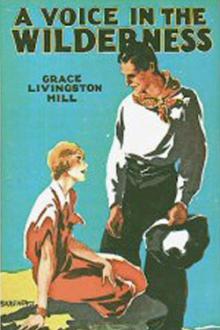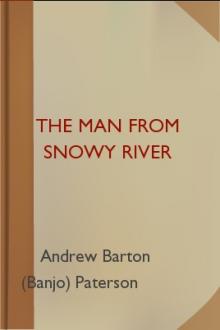The Gringos<br />A Story Of The Old California Days In 1849, B. M. Bower [cheapest way to read ebooks TXT] 📗

- Author: B. M. Bower
Book online «The Gringos<br />A Story Of The Old California Days In 1849, B. M. Bower [cheapest way to read ebooks TXT] 📗». Author B. M. Bower
Dade grinned and followed him outside. "Good thing I'm used to you," he commented grimly, "or my head would be whirling, right now." Not a word, you will observe, as to whether his own interests would be furthered by this sudden departure; but that was Dade's way. Not a word about the sudden change from last evening, when Jack had eaten at Don Andres' table and had talked amiably with José—amiably in spite of the fact that every one of them understood perfectly that the amiability was but the flowers of courtesy strewn over a formal—and perhaps a temporary—truce. But José was not a fixture upon the ranch, and the don's friendship for the two seemed unchanged.
Dade did not argue nor did he question. Barring details, he thought he understood why it was that Jack wanted to go—why it was impossible for him to stay. A girl may be only seventeen and as irresponsible as a kitten, but for all that she may play an important part in the making and the marring of a man's most practical plans.
When he returned from the house, Don Andres walked beside him. The two of them reached the corral just as Jack released Solano's foot from the rawhide loop that had held it high while Jack cinched the saddle in place. When Jack saw them he came forward, wiping from his face the beads of perspiration which the tussle had brought there.
"Señor Hunter tells me that you are going away," Don Andres began almost at once. "That you are acting wisely I am truly convinced, Señor Allen, though it irks me to say that it is so. For a little time would all be well, perchance; for as long as your generosity fills the heart of José with gratitude, so that no ill will finds room there. But his temper is hot and hasty, as is yours; and with other considerations which one must face—" He held out his hand for farewell.
"Adios, Señor. I am indeed sorry that you must leave us," he said simply. "Under other circumstance I should urge you to remain; but my lips are sealed, as you well know. Adios, amigo mio. I have liked thee well." He gripped Jack's hand warmly, and turned away. Dade he gave a final handclasp, and walked slowly back to the house, his proud old head bowed upon his chest.
Valencia, yawning prodigiously, came forth from the vaqueros' hut and glimpsed them just as Jack was bringing Solano to something like decent behavior before they started down the slope.
"Dios!" cried Valencia, and ran to see what was taking place. For while the taming of a mustang is something which a man may undertake whenever the mood of him impels, the somewhat bulky packages tied behind the high cantles could mean nothing save a journey.
When they told him, he expostulated with tears in his eyes. He had been nursing since yesterday a secret hope that the blue-eyed one would teach him that wonderful trick of making a riata climb upward of its own accord as if it were a live thing. Beyond that he was genuinely distressed to see them go, and even threatened to go with them before he yielded finally to the inevitable—remembering Felice, perhaps, and the emptiness of life without her.
"Señor, should you chance to see that great hombre who whipped Manuel so completely, you would do well to give the warning. Me, I heard from Ronaldo last night that Manuel spoke many threats against that gringo who had beaten him. Carlos also—and I think they mean ill towards the Señor Seem'son. Me, I thought to ride that way to-morrow and give the word of warning."
"We're going there now," said Jack, with some difficulty holding the yellow horse quiet, while he shook hands with Valencia. "Adios, Valencia. If you ever come near our mine, remember that what we have will be yours also."
"Gracias, gracias—adios—" He stood staring regretfully after them when they started erratically down the slope; erratically, because Solano preferred going backward or sidewise, or straight up and down, to going forward. They were not two hundred yards away from the stable when Valencia overtook them, having saddled in haste that he might ride with them for a way.
"That caballo, he needs two to show him the way, Señors," grinned Valencia, to explain his coming. "Me, I shall help to get him started, and we will say adios farther up the valley, unless the señors desire to ride to Señor Seem'son's cabin."
"That's where we're headed for, believe it or not!" laughed Jack, who at that moment was going round and round in a circle. "When he gets so dizzy he can't tell up from down, maybe he'll do as I say about going straight ahead."
Eventually Solano did decide to move forward; and he did so at such a pace that speedily they reached Jerry's claim and galloped furiously up the slope to the cabin.
"Must be asleep," Dade remarked carelessly, when they faced a quiet, straight-hanging bullock hide.
But when a loud hallo brought no sign, even from Tige, he jumped off and went to investigate the silence.
"There ain't a single soul here," he announced, "and that's funny, too. They always leave Tige to watch the place, you know—or they did before I went on rodeo."
"They do yet," said Jack. "Only Mrs. Jerry never goes anywhere. She stays at home to watch their garden. That's it, over there; her 'truck patch,' she calls it."
"Things are all upset here. Get off, Jack, and let's see what's up. I don't like the looks of things, myself." Dade's face was growing sober.
Valencia, on the ground, was helping Jack with Solano. But he turned suddenly and cast an uneasy glance towards the quiet log hut.
"Señors, for these two who live here I am afraid! It is as I told you; that Manuel was speaking threats against the big señor, last night; and he had drunk much wine, so that he walked not steady. And with Carlos and perhaps one or two others—of that I am not sure—he rode away soon after dark. Dolt, that I did not tell thee at the time! But I was dancing much," he confessed, "and the fiesta dance makes drunken the feet, that they must dance—"
"Well, tie up that mustang and never mind." Dade was walking aimlessly about, looking for something—what, he did not know. "There's tracks all around, and—" he disappeared behind the cabin.
In a minute he was calling them, and his tone brought them on the run. "Now, what do you make of that?" he wanted to know, and pointed.
Two fresh mounds of earth, narrow, long—graves, if size and shape meant anything at all. The form of a "T" they made there in the grass; for one was short and extended across, near one end of the larger one.
"What do you make of that?" Dade repeated, much lower than before.
"Señors, evil has been done here. Me, I think—"
"Don't think! Bring that shovel, over there—see it, by the tree?—and dig. There's one way to find out what it means."
Valencia did not want to dig into those mounds, but the voice was that of his majordomo, whom he had for a month obeyed implicitly. He got the shovel and he dug. And since it seemed too bad to make him do all the work, Jack and Dade each took their turn in opening the grave.
And in that grave they found Mrs. Jerry, wrapped in her faded patchwork quilt, her hands folded at peace, her wistful brown eyes closed softly—There was no need to speculate long upon the cause of her death. Her shapeless brown dress was stained dark from throat to waist. Dade, shuddering a little, very gently lifted the hands that were folded; beneath was the hole where the bullet had struck.
"Dios!" said Valencia, in a whisper.
They were three white-faced young men who stood there, abashed before the tragedy they had uncovered. After a little, they filled the grave again and stood back, trying to think the thing out and to think it out calmly. They drew away from the spot, Dade leading.
"We don't need to open the other one," he said. "That holds Tige, of course. I wonder—"
"Let's look around out there in the bushes," Jack suggested. "I can see how the thing must have happened; somebody came and started shooting—and that rifle he called Jemina, and the two pistols—don't you reckon they did some good for themselves?"
"Probably—if Jerry was here."
"Man, he must have been here! Who else—" he tilted his head towards the graves. Surely, no one but Jerry would have buried them so, with Tige lying at the feet of his mistress. And, as Jack presently pointed out, if the shooting had taken place in Jerry's absence, he would certainly have notified them at the ranch. And Jack had a swift mental picture of Jerry galloping furiously up to the patio on one of his mules, brandishing his rifle, while he shouted to all around him the news of this terrible, unbelievable thing that had befallen him.
They did not search long before they found plenty of evidence that Jerry had been there at the time of the trouble. They found Manuel lying on his back, with his beard clotted and stained red, and his black eyes staring dully at the sky. Farther along they came upon Carlos, lying upon his face, with a blood-stained trail behind him in the grass to show how far he had crawled before death overtook him. But they did not find Jerry, look where they would.
In the cabin, where they finally went to search systematically for clews, they found places where the logs had been splintered near the loopholes with bullets from without. A siege it had been, then.
Jack, more familiar with the interior than either of the others because of his frequent visits there with Teresita, missed certain articles; the frying pan, an iron pot, a few dishes, and the bedding, to be exact.
So, finally, they decided that Jerry, having had the worst befall him, had buried his dead, packed a few necessary things upon one of the mules, mounted the other, and had gone—where? There was no telling where, in that big land. Somewhere into the wilderness, they guessed, where he could be alone with the deadly hurt Fate and his enemies had given him.
The oxen, when they went outside, came shambling up the slope to the oak tree where they were wont to spend the night near the prairie schooner that had been their homing place for many a month. But without a doubt the mules were gone; otherwise, Jack insisted, they would be near the oxen, as was their gregarious habit.
"Jerry's gone—pulled out," Jack asserted for the third or fourth time. "And the mules, and—the pup. Where's Chico? I haven't seen or heard anything of him; have you?"
They had not; and they immediately began calling and looking for Chico, who was at that stage of puppyhood that insists upon getting in front of one and then falling down and lying, paws in the air, waiting to be picked up and petted. But Chico did not come lumbering up like an animated black muff, and they could not find his little, dead body.
It occurred to Dade that he might be buried with Tige; and, once the idea was presented to Jack, he could not content himself to leave the place until he knew to a certainty. He would never have admitted it, but there were certain sweet memories which made that particular pup not at all like other black pups. He got the shovel, and he dug in the little grave until he was certain that Tige lay there, and that he was alone.
"Well, he's taken the pup along, then; and that proves to me that Jerry wasn't crazy, or anything like that. He's just pulled out, because he couldn't stand it around here any longer—and I don't blame him. But I wish I knew where; we'd take him up to the mine with us; huh?"
"Yes—but we're about fourteen hours too late to find out where he went. If I'm any judge, these bodies have been dead that long. And if we found him, the chances are he wouldn't go. If I'm any good at guessing poor Jerry's state of mind, right now, he don't want to see or speak to any human being on earth."
"I guess you're right," Jack assented, after a meditative pause. "He just worshiped that poor little woman."
Beyond that, neither of them attempted to put into speech the tragedy; it was beyond the poor words we have thus far coined for our needs, like many another thing that happens in these lives we live. They waited a little while longer, wondering what they could or should do.
Mrs. Jerry lay easily where she had been placed by the man who loved her. The killers had been killed by the same hand that laid her deep, in her faded,





Comments (0)